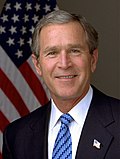| Part of the lead-up to the Iraq War | |
 Colin Powell holding up a model vial of the supposed weaponized anthrax. | |
| Date | February 5, 2003 |
|---|---|
| Time | 10:30 a.m. (Eastern Time Zone) |
| Venue | United Nations Security Council at the Headquarters of the United Nations |
| Location | Manhattan, New York City |
| Type | PowerPoint presentation |
| Theme | Rationale for the Iraq War |
| Outcome | Invasion of Iraq, U.S. reputation damage, Powell accused of having lied |
| | |
| Events leading up to the Iraq War |
|---|
 |
|
On February 5, 2003, the Secretary of State of the United States Colin Powell gave a PowerPoint presentation [1] [2] to the United Nations Security Council. He explained the rationale for the Iraq War which would start on March 20, 2003 with the invasion of Iraq. The decision to invade Iraq had already been made prior to the presentation being given.
Contents
- Selection and preparation
- Content
- Media
- Slides
- Reactions
- Iraqi reaction
- Others
- Analysis
- Further developments
- See also
- Further reading
- References
- External links
The content of the presentation was based on unreliable evidence. Powell was criticized for lying, while the U.S. saw its credibility heavily damaged.








